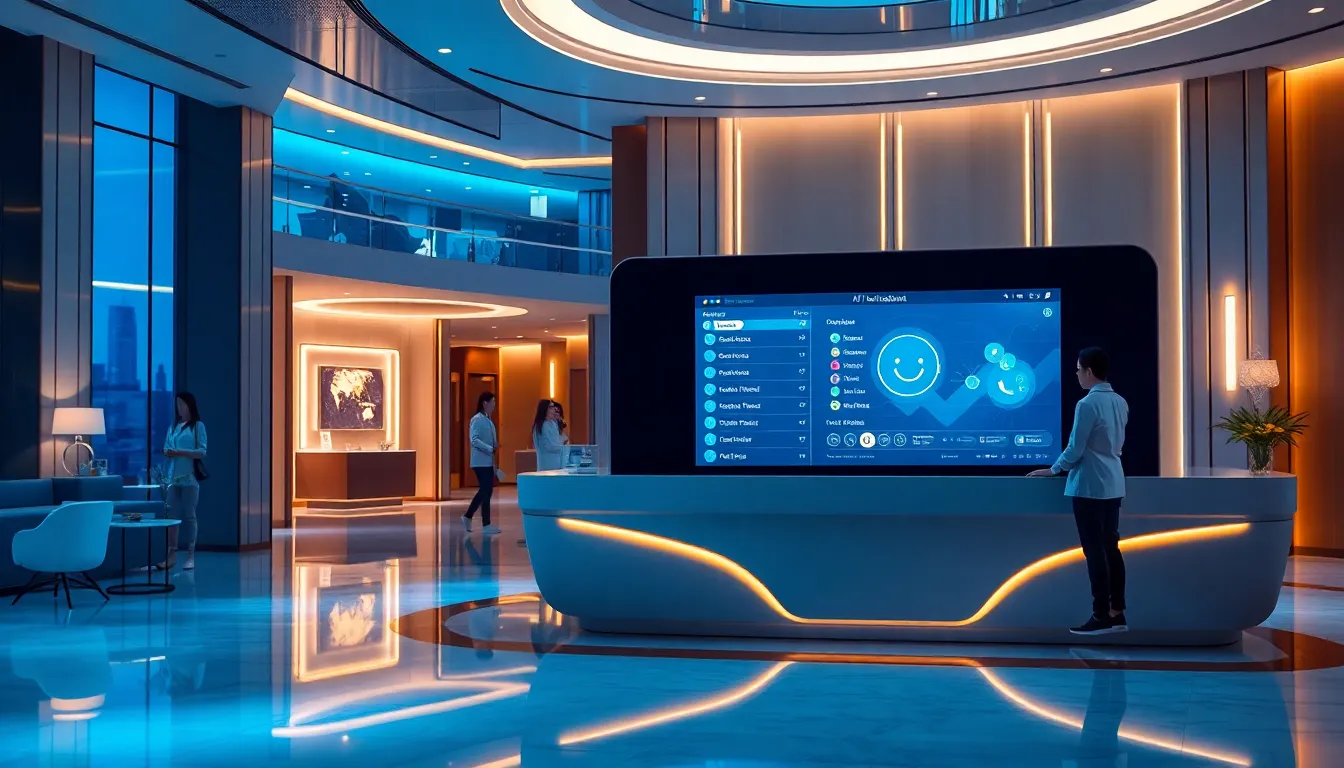Back to blog
"The Revolutionary Rise of AI Receptionists in Hospitality and Healthcare"
The Rise of AI Receptionists: Enhancing Hospitality and Healthcare
The integration of Artificial Intelligence (AI) in various industries has been a significant talking point in recent years. One area that has seen substantial growth is the use of AI-powered receptionists in hospitality and healthcare settings. The concept of AI receptionists is not new, but its application has become more widespread and sophisticated, transforming the way businesses interact with their customers and patients. In this article, we will delve into the world of AI receptionists, exploring their advantages, benefits, and future implications in the hospitality and healthcare sectors.
Introduction
A brief overview of AI receptionists reveals that they are designed to automate tasks that were previously performed by human receptionists. These tasks include check-in and check-out processes, appointment scheduling, and provision of general information. The primary purpose of AI receptionists is to enhance the efficiency and effectiveness of these tasks, allowing human staff to focus on more complex and high-value tasks. By leveraging AI technology, businesses can improve their customer service, reduce wait times, and increase overall satisfaction.
The purpose of AI receptionists is multifaceted. Firstly, they aim to provide a seamless and personalized experience for customers and patients. By using machine learning algorithms and natural language processing, AI receptionists can understand and respond to queries in a more human-like manner. Secondly, they seek to reduce the workload of human receptionists, enabling them to concentrate on tasks that require empathy, emotional intelligence, and complex decision-making. Finally, AI receptionists aim to provide valuable insights and data that can be used to improve business operations and decision-making.
The Advantages of AI Receptionists in Hospitality
The hospitality industry has been at the forefront of adopting AI-powered receptionists. Hotels, restaurants, and other establishments have recognized the benefits of using AI to enhance their customer experience. One of the primary advantages of AI receptionists in hospitality is improved efficiency. By automating tasks such as check-in and check-out, AI receptionists can reduce wait times and minimize the risk of human error. This, in turn, leads to increased customer satisfaction and loyalty.
Another significant advantage of AI receptionists in hospitality is the enhanced customer experience. AI-powered receptionists can provide personalized recommendations, offer special promotions, and assist with room service and other amenities. By using machine learning algorithms, AI receptionists can analyze customer preferences and tailor their services accordingly. This level of personalization can lead to increased customer loyalty and retention, ultimately driving revenue growth for the business.
Data-driven insights are also a significant advantage of AI receptionists in hospitality. By analyzing customer data and behavior, AI receptionists can provide valuable insights that can inform business decisions. For example, AI receptionists can identify peak periods, popular amenities, and customer preferences, enabling hotels and restaurants to optimize their operations and marketing strategies. This data-driven approach can lead to increased efficiency, reduced costs, and improved customer satisfaction.
The Benefits of AI Receptionists in Healthcare
The healthcare industry has also seen significant benefits from the adoption of AI-powered receptionists. One of the primary benefits of AI receptionists in healthcare is the streamlined patient flow. By automating tasks such as appointment scheduling and patient check-in, AI receptionists can reduce wait times and minimize the risk of human error. This, in turn, leads to increased patient satisfaction and improved health outcomes.
Another significant benefit of AI receptionists in healthcare is increased patient satisfaction. AI-powered receptionists can provide personalized support and guidance, assisting patients with their queries and concerns. By using natural language processing, AI receptionists can understand and respond to patient queries in a more human-like manner, providing empathy and reassurance. This level of personalization can lead to increased patient loyalty and retention, ultimately driving revenue growth for the healthcare provider.
Enhanced data security is also a significant benefit of AI receptionists in healthcare. By using AI-powered receptionists, healthcare providers can reduce the risk of data breaches and cyber attacks. AI receptionists can analyze patient data and behavior, identifying potential security threats and notifying healthcare staff accordingly. This level of security can lead to increased patient trust and confidence, ultimately driving revenue growth for the healthcare provider.
Implementing AI Receptionists in Your Business
Implementing AI receptionists in your business requires careful consideration and planning. The first step is to select the right solution for your business needs. This involves researching and evaluating different AI-powered receptionist platforms, considering factors such as functionality, scalability, and integration with existing systems. By selecting the right solution, businesses can ensure a seamless and efficient implementation process.
Integrating AI receptionists into existing systems is also crucial. This involves connecting the AI-powered receptionist platform with existing customer relationship management (CRM) systems, property management systems (PMS), and other relevant software. By integrating AI receptionists with existing systems, businesses can ensure a streamlined and efficient operation, minimizing the risk of errors and discrepancies.
Training staff for AI-powered receptionists is also essential. This involves providing staff with the necessary skills and knowledge to effectively use and manage the AI-powered receptionist platform. By training staff, businesses can ensure a smooth transition to the new system, minimizing the risk of errors and downtime.
Future of AI Receptionists
The future of AI receptionists is exciting and promising. Advancements in technology, such as machine learning and natural language processing, are expected to drive further innovation and adoption of AI-powered receptionists. As AI technology continues to evolve, we can expect to see more sophisticated and human-like AI receptionists, capable of understanding and responding to complex queries and emotions.
Expected improvements in AI receptionists include enhanced personalization, increased efficiency, and improved data security. By leveraging machine learning algorithms and natural language processing, AI receptionists will be able to provide more tailored and personalized experiences for customers and patients. This, in turn, will lead to increased customer loyalty and retention, ultimately driving revenue growth for businesses.
Future applications of AI receptionists are vast and varied. We can expect to see AI-powered receptionists in industries such as retail, finance, and education, transforming the way businesses interact with their customers and stakeholders. As AI technology continues to evolve, we can expect to see more innovative and creative applications of AI receptionists, driving growth and innovation in various industries.
In conclusion, the rise of AI receptionists is transforming the way businesses interact with their customers and patients. By leveraging AI technology, businesses can improve their customer experience, reduce wait times, and increase overall efficiency. As AI technology continues to evolve, we can expect to see more sophisticated and human-like AI receptionists, capable of understanding and responding to complex queries and emotions. Whether you are a hotel owner, restaurant manager, or healthcare provider, AI receptionists are an exciting and promising development that can drive growth and innovation in your business.
One of the most significant advantages of AI receptionists is their ability to provide 24/7 support. Unlike human receptionists, AI receptionists do not require breaks, vacations, or sick leave, making them an attractive option for businesses that operate around the clock. Additionally, AI receptionists can handle multiple queries simultaneously, reducing wait times and improving customer satisfaction.
Another significant advantage of AI receptionists is their ability to analyze customer data and behavior. By using machine learning algorithms, AI receptionists can identify patterns and trends, providing valuable insights that can inform business decisions. For example, AI receptionists can analyze customer preferences, identifying popular amenities and services, and providing recommendations for improvement.
However, the adoption of AI receptionists also raises several challenges and concerns. One of the primary concerns is job displacement, as AI receptionists may replace human receptionists in certain roles. Additionally, there are concerns about data security and privacy, as AI receptionists may have access to sensitive customer information. To address these concerns, businesses must ensure that they implement AI receptionists in a responsible and ethical manner, prioritizing transparency, accountability, and customer trust.
Ultimately, the success of AI receptionists depends on their ability to provide a seamless and personalized experience for customers and patients. By leveraging AI technology, businesses can revolutionize the way they interact with their customers, driving growth, innovation, and revenue. As AI technology continues to evolve, we can expect to see more exciting and promising developments in the field of AI receptionists, transforming the way businesses operate and interact with their customers.
To fully realize the potential of AI receptionists, businesses must invest in research and development, exploring new and innovative applications of AI technology. This includes investing in machine learning algorithms, natural language processing, and data analytics, to name a few. By investing in these areas, businesses can stay ahead of the curve, driving growth and innovation in their industries.
In addition to investing in research and development, businesses must also prioritize customer trust and transparency. This includes ensuring that AI receptionists are transparent about their capabilities and limitations, and that customers are aware of the data being collected and used. By prioritizing customer trust and transparency, businesses can build strong relationships with their customers, driving loyalty and retention.
Finally, businesses must also consider the ethics and social implications of AI receptionists. This includes addressing concerns about job displacement, data security, and bias, to name a few. By prioritizing ethics and social responsibility, businesses can ensure that AI receptionists are developed and implemented in a responsible and sustainable manner, driving growth and innovation while minimizing harm.
In conclusion, the rise of AI receptionists is a significant development in the world of business, driving growth, innovation, and revenue. By leveraging AI technology, businesses can revolutionize the way they interact with their customers, providing personalized and seamless experiences that drive loyalty and retention. As AI technology continues to evolve, we can expect to see more exciting and promising developments in the field of AI receptionists, transforming the way businesses operate and interact with their customers.
To stay ahead of the curve, businesses must invest in research and development, prioritizing transparency, accountability, and customer trust. By doing so, businesses can ensure that AI receptionists are developed and implemented in a responsible and sustainable manner, driving growth and innovation while minimizing harm. The future of AI receptionists is exciting and promising, and businesses that prioritize ethics, transparency, and customer trust will be well-positioned to succeed in this rapidly evolving landscape.


